

Sam Harris on the Dangers of Atheism. An Index to Creationist Claims. Can an omnipotent deity be omnibenevolent – Thoughts from Kansas. Folks are talking about the problem of evil.

John Wilkins takes on the problem of the problem of evil and Darwin, arguing that, for theologies where the problem of evil is a problem, evolution probably does less to exacerbate the issue than basic physics, or physiology, or first principles of ecology. And he’s right. But one sentence setting up this argument doesn’t work for me: Evil exists, so if you believe in a “tri-omni” deity (omniscient, omnipotent, omnibenevolent), you had better find a reconciliation. This idea of an omnipotent, omniscient, omnibenevolent god is pretty common, but the more I consider those three properties, the harder it is to see how anything could be all of those at once. Consider: Stating than an omnipotent, omniscient deity is also omnibenevolent essentially restricts what that deity can do: it can’t do evil. But that objection (which is of the “can god make a rock so heavy even she can’t lift it?”
And that’s how it ends. Foxhole Atheism. On Absurdity: William Lane Craig and Actual Infinites. Assuming creation, what is God’s relationship to time?
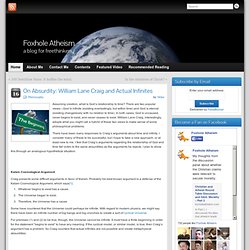
There are two popular views—God is infinite (existing everlastingly, but within time) and God is eternal (existing changelessly with no relation to time). In both cases, God is uncaused, never begins to exist, and never ceases to exist. William Lane Craig, interestingly, adopts what you might call a hybrid of these two views to make sense of some philosophical problems. There have been many responses to Craig’s arguments about time and infinity. I consider many of these to be successful, but I hope to take a new approach, or at least new to me. Kalam Cosmological Argument Craig presents some difficult arguments in favor of theism. Whatever begins to exist has a cause.The Universe began to exist.Therefore, the Universe has a cause Some have countered that the Universe could perhaps be infinite. For premises (1) and (2) to be true, though, the Universe cannot be infinite. Infinite Absurdities Craig’s Resolution How can this be?
Greg Bahnsen. Greg L.
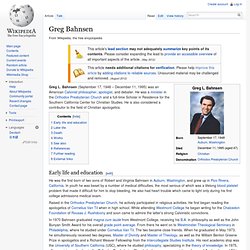
Bahnsen (September 17, 1948 – December 11, 1995) was an American Calvinist philosopher, apologist, and debater. He was a minister in the Orthodox Presbyterian Church and a full-time Scholar in Residence for the Southern California Center for Christian Studies. He is also considered a contributor to the field of Christian apologetics. Early life and education[edit] He was the first born of two sons of Robert and Virginia Bahnsen in Auburn, Washington, and grew up in Pico Rivera, California. Raised in the Orthodox Presbyterian Church, he actively participated in religious activities. In 1970 Bahnsen graduated magna cum laude from Westmont College, receiving his B.A. in philosophy as well as the John Bunyan Smith Award for his overall grade point average. Free Articles. Apologetics. 10 Questions every Atheist must answer. Re: 10 Questions every Atheist must answer (1/2)
Re: Atheism is a mental illness.wmv. 10 Crappy Questions every Atheist must answer. Supreme Deities Jesus Dressup! Naturalistic Explanations For Religion. The goal of this article is, quite simply, to explain how religion came to be.
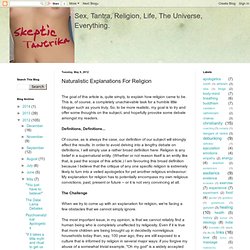
This is, of course, a completely unachievable task for a humble little blogger such as yours truly. So, to be more realistic, my goal is to try and offer some thoughts on the subject, and hopefully provoke some debate amongst my readers. Definitions, Definitions... Of course, as is always the case, our definition of our subject will strongly affect the results. In order to avoid delving into a lengthy debate on definitions, I will simply use a rather broad definition here: Religion is any belief in a supernatural entity. Empathy, Reason, Presuppositional Apologetics.
The following are very rough, and partly speculative, outlines of how I see empathy, reason, their interrelations, and what kinds of conditioning can overshadow one or the other.
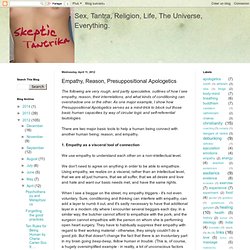
As one major example, I show how Presuppositional Apologetics serves as a mind-trick to block out those basic human capacities by way of circular logic and self-referential tautologies. There are two major basic tools to help a human being connect with another human being: reason, and empathy. Psychology of Belief Part 10: Summary and Conclusions. Bill Nye: Creationism Is Not Appropriate For Children. I believe i know. Common Sense Atheism — Atheism is just the beginning. Now it's time to tackle the harder questions. — Page 3. Presuppositional apologetics. John Frame (theologian)
John M.
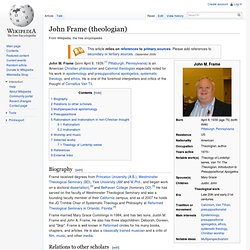
Frame (born April 8, 1939,[1] Pittsburgh, Pennsylvania) is an American Christian philosopher and Calvinist theologian especially noted for his work in epistemology and presuppositional apologetics, systematic theology, and ethics. He is one of the foremost interpreters and critics of the thought of Cornelius Van Til. Frame married Mary Grace Cummings in 1984, and has two sons, Justin M. Frame and John A. Frame. Frame has elaborated a Christian epistemology in his 1987 work The Doctrine of the Knowledge of God. Thunderf00t vs Kent Hovind at Reason Rally. At the recent "Reason Rally" event, well-known youtube atheist activist Thunderf00t was - umm, well - "interviewed" by creationist Eric Hovind, son of Kent Hovind.
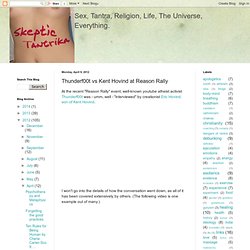
I won't go into the details of how the conversation went down, as all of it has been covered extensively by others. (The following video is one example out of many.) Suffice it to say that it was a textbook example of presuppositional apologetics, pre-planned and well-designed to make a scientist look bad, simply because the scientist tried to honestly answer questions that were by no means honest. I think that episodes like this raise a more general question: Do I, as an atheist, want to engage in debates like that? Do I want to train strategies for "winning" those debates? 1. To me, the issue of "winning" a debate is a rather weird concept.
Part of that weirdness seems to stem from cultural heritage. Call me naive, but I tend to think that discussions should be entered with an open mind and an open heart. 2. Empathy, Reason, Presuppositional Apologetics.